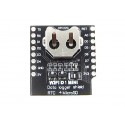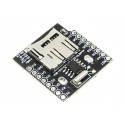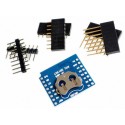Rtc Ds1307 Clock Mini And MicroSd Module Shield For Wemos D1Mini
Rs. 153.00 Rs. 175.00
- Brand: https://www.maximintegrated.com/en/products/analog/real-time-clo
- Product Code: SEN-RTC
- Availability: In Stock
- Price in reward points: 2
- For Bulk Order
 9962060070
9962060070
SPECIFICATIONS:
> SD card type :microSD
> Supported file system :FAT16 or FAT32
> Backup battery type :CR1220
OVERVIEW:
-With this Data Log Shield for WiFi D1 Mini board, can saving data to files on any FAT16 or FAT32 formatted MicroSD card.
-The included RTC (Real Time Clock) can be used to timestamp all your data with the current time, so that you know precisely what happened when!
-SD card interface works with FAT16 or FAT32 formatted cards.
-Real time clock (RTC) keeps the time going even when the power disconnected. The coin cell battery backup last date and time.
-RTC protected from wrong connecting of battery.
PACKAGE INCLUDES:
1 PCS x Rtc Ds1307 Clock Mini And Micro
Sd Module Shield For Wemos D1 - Mini.
> https://www.maximintegrated.com/en/products/analog/real-time-clocks/DS1307.html
//SOURCE CODE TAKEN FROM BELOW LINK
//https://github.com/wemos/D1_mini_Examples/blob/master/examples/04.Shields/Micro_SD_Shield/CardInfo/CardInfo.ino
/*
* Micro SD Shield - Card info
*
* This example shows how use the utility libraries on which the'
* SD library is based in order to get info about your SD card.
* Very useful for testing a card when you're not sure whether its working or not.
*
*
* The SD card library uses 8.3 format filenames and is case-insensitive.
* eg. IMAGE.JPG is the same as image.jpg
*
* created 28 Mar 2011 by Limor Fried
* modified 9 Apr 2012 by Tom Igoe
*
* This example code is in the public domain.
* https://github.com/esp8266/Arduino/blob/master/libraries/SD/examples/CardInfo/CardInfo.ino
*/
// include the SD library:
#include <SPI.h>
#include <SD.h>
// set up variables using the SD utility library functions:
Sd2Card card;
SdVolume volume;
SdFile root;
// change this to match your SD shield or module;
// WeMos Micro SD Shield V1.0.0: D8
// LOLIN Micro SD Shield V1.2.0: D4 (Default)
const int chipSelect = D4;
void setup()
{
// Open serial communications and wait for port to open:
Serial.begin(9600);
while (!Serial) {
; // wait for serial port to connect. Needed for Leonardo only
}
Serial.print("\nInitializing SD card...");
// we'll use the initialization code from the utility libraries
// since we're just testing if the card is working!
if (!card.init(SPI_HALF_SPEED, chipSelect)) {
Serial.println("initialization failed. Things to check:");
Serial.println("* is a card inserted?");
Serial.println("* is your wiring correct?");
Serial.println("* did you change the chipSelect pin to match your shield or module?");
return;
} else {
Serial.println("Wiring is correct and a card is present.");
}
// print the type of card
Serial.print("\nCard type: ");
switch (card.type()) {
case SD_CARD_TYPE_SD1:
Serial.println("SD1");
break;
case SD_CARD_TYPE_SD2:
Serial.println("SD2");
break;
case SD_CARD_TYPE_SDHC:
Serial.println("SDHC");
break;
default:
Serial.println("Unknown");
}
// Now we will try to open the 'volume'/'partition' - it should be FAT16 or FAT32
if (!volume.init(card)) {
Serial.println("Could not find FAT16/FAT32 partition.\nMake sure you've formatted the card");
return;
}
// print the type and size of the first FAT-type volume
uint32_t volumesize;
Serial.print("\nVolume type is FAT");
Serial.println(volume.fatType(), DEC);
Serial.println();
volumesize = volume.blocksPerCluster(); // clusters are collections of blocks
volumesize *= volume.clusterCount(); // we'll have a lot of clusters
volumesize *= 512; // SD card blocks are always 512 bytes
Serial.print("Volume size (bytes): ");
Serial.println(volumesize);
Serial.print("Volume size (Kbytes): ");
volumesize /= 1024;
Serial.println(volumesize);
Serial.print("Volume size (Mbytes): ");
volumesize /= 1024;
Serial.println(volumesize);
Serial.println("\nFiles found on the card (name, date and size in bytes): ");
root.openRoot(volume);
// list all files in the card with date and size
root.ls(LS_R | LS_DATE | LS_SIZE);
}
void loop()
{
// nothing happens after setup
}
15 DAYS




